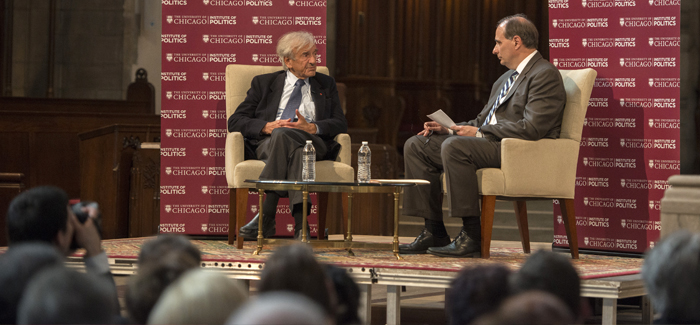
“What would I do with hatred?” Wiesel (left) said of his Holocaust experience. (Photography by Robert Kozloff)
Elie Wiesel searches for a moral dimension in the political process.
“Really, I don’t like politics,” said Nobel Peace Prize winner Elie Wiesel, midway through a conversation largely about politics. He was being facetious, although he wasn’t exactly joking.
“Could someone take down these banners?” cracked David Axelrod, AB’76. Behind them hung banners emblazoned with the logo of the Institute of Politics, which Axelrod directs. Before them, the pews of Rockefeller Chapel were packed for a Q&A between the two men. They first met at President Barack Obama’s 2009 inauguration, and the idea of a public “conversation between two friends,” as Wiesel described it, wasn’t new; they’d done it before in 2010 at New York’s 92nd Street Y. This May they renewed the dialogue for a Chicago audience.
As Axelrod alternated between his own questions and those submitted in advance by UChicago community members, the conversation circled issues that have echoed through most of Wiesel’s life, since his imprisonment at Auschwitz and Buchenwald: about strength and forgiveness and healing. Axelrod asked how Wiesel managed to maintain his Jewish faith even after his experience in the camps. It seemed to be a question without a clear answer, even all these decades later. Where, Wiesel said, was God during the Holocaust? He confessed he didn’t know. “I have the right to ask these questions; I even have the right to indict God himself. But not to stop there. So the next day, you go and pray, because I prayed all my life. ... How could I not, afterward?”
Often, the conversation turned to politics, both domestic and global. “Politics without morality will unavoidably bring bad results,” Wiesel said, elaborating on his perpetual disappointment with the political process. “To work for the polis, for the city, should be a very noble endeavor. Unfortunately, we see it every day, not only in America, that politics also means power. And power corrupts. How do you avoid that? I don’t know.”
As a start, however, he advocated a greater emphasis on the Greek concept of ethos. “I would elect someone, to anything, only based on ethos. ... Ethos means not oneself, but for the other. Always for the other. ... [In] the political debate in America, have you often heard the word ethos? You want votes.”
Wiesel, the author of 57 books including the autobiographical Holocaust novel Night, is an idealist who believes that many problems could be solved through moral behavior and a rigorous search for solutions. He suggested, for example, that President Obama convene a conference of world leaders to discuss how to address hatred. In the wake of the Sandy Hook shootings, Wiesel urged a “march against violence” to get Congress, or anyone, to take action. To address religious extremism around the world, he advocated a gathering of sectarian leaders, who could jointly study their foundational spiritual texts “and see what can be done, so the text should not become so full of hate, or of anger, or of violence to each other.” He asserted multiple times his belief that the United States—as “still the greatest nation in the world,” as well as the most powerful—has a moral obligation to intervene wherever there is injustice.
But what happens, Axelrod asked, when the overthrow of a despotic leader who commits atrocities results in chaos and more atrocities, as in Egypt? What should the United States do then? Wiesel insisted that if he had access to the White House intelligence reports the president sees every morning, then “I could answer you.”
“I can attest,” said Axelrod, “as someone who has been there, that you can have a lot of information and the answers aren’t always clear.”
Wiesel, who has taught in Boston University’s departments of religion and philosophy since 1976, waded into other geopolitical topics: the dispute between Israel and the Palestinians, Syria’s civil war. During an exchange that began with Axelrod asking about Islamic extremism, Wiesel said, “In all religions, fanatics, by definition, are individuals who speak to themselves, and they don’t want to hear another voice.”
But Wiesel spoke most stirringly, and at greater length, on spiritual matters. Axelrod’s very first question was about how Wiesel managed to resist hatred against his Nazi tormentors, or anyone. “What would I do with hatred?” Wiesel said. “I don’t think that hatred has produced great works of art. I don’t know one. And to the contrary, wherever there was hatred, like in Hitler’s Germany, show me one great work of art that was written or produced in Germany under Hitler.”
On the near impossibility of conveying the experiences at Auschwitz and Buchenwald in writing, Wiesel said, “Many of my colleagues feel it to this day. Books we have written—we bear witness, but I am not sure, to this day, I am not sure whether the words that I used really did communicate what I wanted to communicate.”
Toward the end of the evening, Axelrod read a question submitted before the talk via Facebook. It referred to a scene from Night when Moishe the Beadle says, “Man comes closer to God through the questions he asks Him. ... I pray to the God within me for the strength to ask Him the real questions.”
The Facebook questioner wondered, “What are the right questions for this moment in time?”
Wiesel paused. “What else can I do to improve and prevent what history has done already?” he suggested.
“And where does that lead one?” Axelrod asked.
“That’s a whole new question in itself,” Wiesel said. “It’s a very good question. That is only a beginning. Sometimes the question is more important than the answer.”
